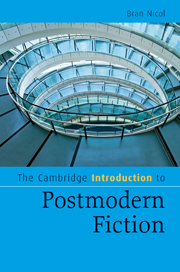Book contents
- Frontmatter
- Contents
- Acknowledgements
- Preface: reading postmodern fiction
- Introduction: postmodernism and postmodernity
- Chapter 1 Postmodern fiction: theory and practice
- Chapter 2 Early postmodern fiction: Beckett, Borges, and Burroughs
- Chapter 3 US metafiction: Coover, Barth, Nabokov, Vonnegut, Pynchon
- Chapter 4 The postmodern historical novel: Fowles, Barnes, Swift
- Chapter 5 Postmodern-postcolonial fiction
- Chapter 6 Postmodern fiction by women: Carter, Atwood, Acker
- Chapter 7 Two postmodern genres: cyberpunk and ‘metaphysical’ detective fiction
- Chapter 8 Fiction of the ‘postmodern condition’: Ballard, DeLillo, Ellis
- References
- Index
- Cambridge Introduction to …
Chapter 8 - Fiction of the ‘postmodern condition’: Ballard, DeLillo, Ellis
Published online by Cambridge University Press: 05 June 2012
- Frontmatter
- Contents
- Acknowledgements
- Preface: reading postmodern fiction
- Introduction: postmodernism and postmodernity
- Chapter 1 Postmodern fiction: theory and practice
- Chapter 2 Early postmodern fiction: Beckett, Borges, and Burroughs
- Chapter 3 US metafiction: Coover, Barth, Nabokov, Vonnegut, Pynchon
- Chapter 4 The postmodern historical novel: Fowles, Barnes, Swift
- Chapter 5 Postmodern-postcolonial fiction
- Chapter 6 Postmodern fiction by women: Carter, Atwood, Acker
- Chapter 7 Two postmodern genres: cyberpunk and ‘metaphysical’ detective fiction
- Chapter 8 Fiction of the ‘postmodern condition’: Ballard, DeLillo, Ellis
- References
- Index
- Cambridge Introduction to …
Summary
Conclusion: ‘ficto-criticism’
The final chapter in this book turns to three important post-war writers whose fiction explores the psychological effects of postmodernity on the individuals who live in it: J. G. Ballard, Don DeLillo, and Bret Easton Ellis. Their work can therefore be (and has been) considered in relation to the theories of postmodernism and postmodernity with which we began this book, especially those by the ‘Holy Trinity’ of postmodern theorists, Jameson, Lyotard, and Baudrillard. Indeed Ballard and DeLillo in particular have been regarded as theorists-by-proxy themselves, producing the kind of work Noel King has termed ‘ficto-criticism’, writing which uses fiction explicitly to analyse cultural and social patterns as an alternative to ‘pure’ theory (King, 1991).
The discussion will focus on key novels by each writer: Ballard's Crash, DeLillo's White Noise and Libra, and Ellis's American Psycho. Each of these novels depict, in different ways, a world which is increasingly divorced from the real as a result of the pervasive power of technology and systems of representation which dominate our culture: television, the media, advertising, and marketing. The consequence for the individual is that the self is experienced as being emptied of substance, lacking coherence and consistency. In each case the implication is that the logic of the ‘Möbius strip’ (a geometrical twisted figure-of-eight structure where the outside edge becomes the inside and vice versa) operates with regard to what were once stable boundaries between society and the individual, private and public, inside and outside.
- Type
- Chapter
- Information
- The Cambridge Introduction to Postmodern Fiction , pp. 184 - 204Publisher: Cambridge University PressPrint publication year: 2009



